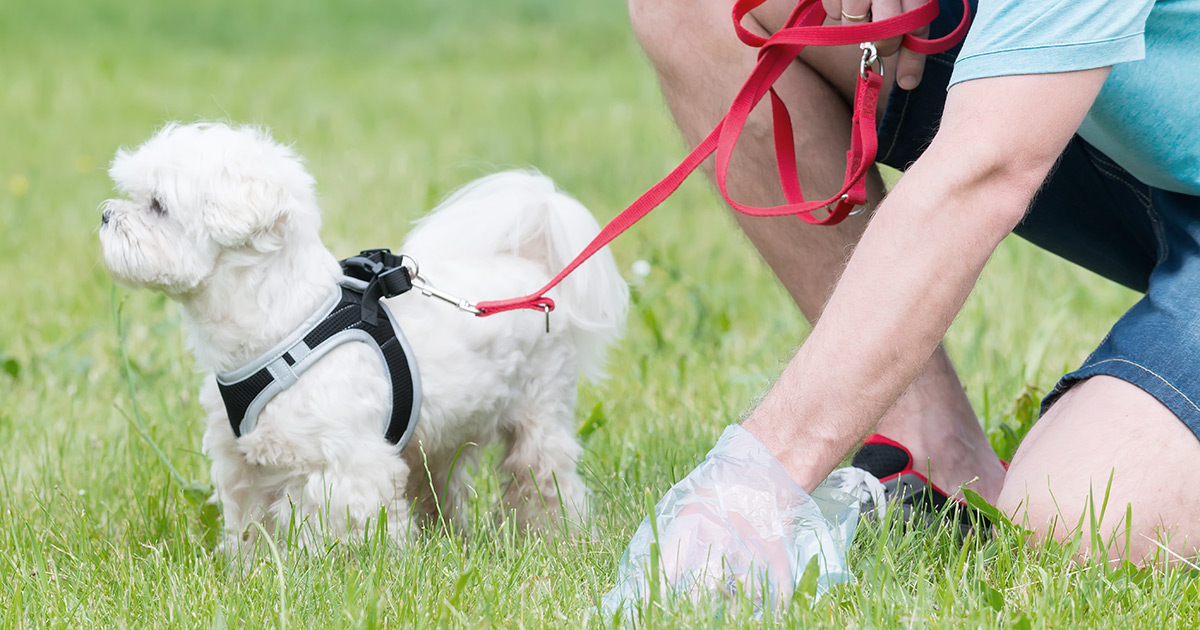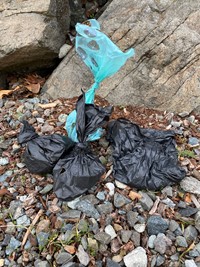
Scene: Two dogs gossip at the Issaquah Highlands Bark Park.
Dog 1 to Dog 2: “Hey what’s with Jake?”
Both dogs look in Jake’s direction. Jake, a burly golden lab, is across the park, hunched over with his ears back tight to his face and tail tucked up to his belly.
Dog 2: “Guess you haven’t heard?”
Dog 1: “No, what’s up? He doesn’t look right.”
Dog 2: “Have another look. We all know that look.”
Dogs stare at Jake across the park.
Dogs 1 and 2, in unison: “It’s the look of poop-barassment.”
Dog 1: “Poor Jake. I hear his owners just leave it in the grass, no bag or anything.”
Dog 2: “Yup, don’t our owners know we have pride? Dignity?”
Dog 1: “Owners just need to do “the pick-up.” They think we don’t notice, but we do!”
Dog poop: a natural reality of dog ownership that comes with an implied “pick up” commitment. Sometimes we’re great at it and sometimes we falter – forgotten poop bags, forgotten poos.
With good intentions and non-intentional neglect, I’m sure we (dog owners) do our best. I can personally attest to good intentions when I carried that poop bag on a hiking trail, only to realize upon exiting, I am now sans the item of accountability. Now that it’s the rainy season, forgotten dog poop turns to mush and is more difficult to pick up. And who can forget the dog who trails behind its owner, silently pooping along the way? (My apologies to Suncadia Lodge for ruining a gorgeous area rug!) Understandably, we have all been busted here and there.
Aside from it being unsightly, unbagged dog poop is a much broader environmental concern. According to a 2018 article by Nyssa Baechler posted to the University of Washington School of Marine and Environmental Affairs student blog, “Currents,” dog poop can have serious negative effects on our health, on the health of our pets, and the health of the environment.
An intestinal parasite called Giardia is transmitted through fecal matter and can make people and animals sick. Giardia is found in dog waste and, if not picked up, the bacteria itself can remain on the grass for up to four years, even if the feces is washed away. This alone should be a strong motivator to do “the pick-up.”
Regarding environmental impact, Baechler cited the Environmental Protection Agency categorized pet waste as a “nonpoint source pollutant” back in 1991. This category of pollutants includes a myriad of smaller particles picked up and distributed by precipitation, mainly rain. Nonpoint source pollutants are “a category that also includes herbicides and insecticides, toxic chemicals from motor vehicles, and even acid drainage from abandoned mines.” According to Baechler, these pollutants enter our waterways and ultimately end up in our lakes, streams, and oceans (this includes Puget Sound).
Do not discard pet waste in compost bins, even if you use biodegradable bags. Keep pet waste secure so that it will not contaminate other waste. Pick up pet waste immediately, secure it in a sealed plastic bag, and throw it in the garbage. The Issaquah Highlands community has 68 dog waste receptacles stocked with plastic bags throughout the community.
Although we cannot control for cow dung and other pollutants, we can be more diligent in picking up after our pets, including the waste in our yards. Dog owners, please do “the pick-up”!
Lauren Segal is a Daphne Park resident.
Editor’s Note: This piece was submitted as an op-ed. Opinions expressed in this piece are solely those of the author. If you are interested in writing for official Issaquah Highlands media, please contact Vicki Grunewald, Highlands Council media editor.






